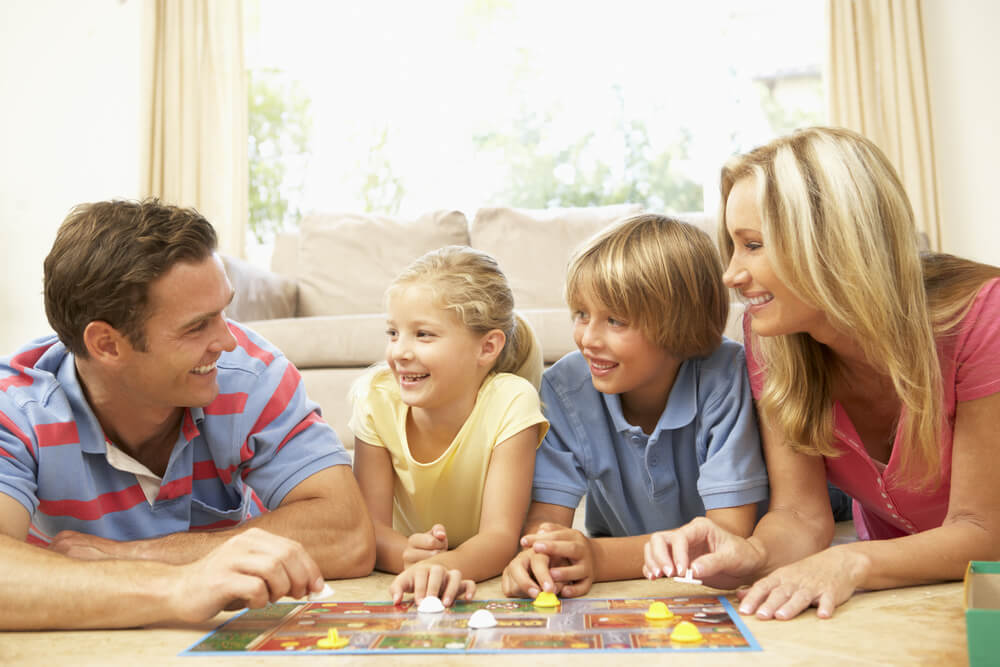In the past, if they couldn't agree on a game's direction, I would try to help, only to make it worse: I was a reality-TV host, watching helplessly as my contestants swapped insults at a show reunion. When Mom is there to listen, they turn defensive and mean; when I say, "Figure it out," they do. I know I'm lucky they have each other to play with, and so I've taught myself to hold back. I tell myself they're learning about compromise and boundaries. As am I. I'm distracted by work (and life). I have a bad temper. I can be critical. And I don't like to play, especially pretend, or anything with dolls or figures, or any games that ask me to hide or wield a Nerf gun. My motto is "Moms don't play." (The other context also applies: I do not play.) Our third child joined the family with this system in place, and he is, as most third children are, remarkably independent.
以前,如果他們不能就游戲的方向達(dá)成一致,我會嘗試幫助他們,但這只會讓事情變得更糟:我就像一名真人秀主持人,無助地看著參賽者在節(jié)目重聚時互相辱罵。媽媽在場傾聽時,他們會變得戒備且刻薄;當(dāng)我說“解決”,他們會照做。我知道我很幸運,因為他們兩個可以一起玩,所以我學(xué)會了克制。我告訴自己,他們正在學(xué)習(xí)妥協(xié)和界限。我也是。工作(和生活)令我分心。我脾氣不好。我可能很挑剔。我不喜歡玩娃娃或玩偶或任何讓我藏起來或揮舞玩具槍的游戲,尤其不喜歡假裝玩。我的座右銘是“媽媽不玩”。(另一句話也適用:我不玩。)我們的第三個孩子加入了實行這種制度的家庭,他和大多數(shù)第三個孩子一樣,非常獨立。
I can't say that my approach is right for everyone. I know that it resonates for me in part because of how I was raised. I have no memories of my parents playing with me. I can remember reading together and their swimming with me in the ocean, but they weren't involved in the fashion shows I filmed with my sisters, and they didn't help me make my magazine, Kid Stuff, either. Not once did they dine at my fictional restaurant.
我不能說我的方法適合所有人。我知道這在一定程度上與我的成長經(jīng)歷有關(guān)。我沒有自已與父母一起玩的記憶。我記得他們和我一起讀書,一起在海里游泳,但是他們沒有參與我和姐妹們拍攝的時裝秀,他們也沒有幫我做雜志,或是其他適合孩子玩的游戲。他們從未在我虛構(gòu)的餐廳里吃過飯。

This isn't a complaint; it's gratitude. They may not be a part of these memories, but they weren't absent either. They were on the edges — there but not there. My parents allowed me private worlds of my own creation, and they respected them. I imagine they felt the same joy I do when I watch my children playing without me; my daughter opens a bakery as her older brother bounces on a giant rubber ball. The baby fills his garbage truck with blocks. Each of us enters his or her own separate sphere. This, I've realized, is my favorite part of mothering. My looking away and then observing.
這不是抱怨;而是感恩。他們可能不是這些記憶的一部分,但他們也沒有缺席。他們在邊緣——既在又不在。我父母允許我擁有自己創(chuàng)造的私人世界,他們尊重我。我看著孩子們在沒有我的情況下玩耍時會感到快樂,我想我的父母當(dāng)時也和我一樣快樂;我女兒開了一家面包店,她的哥哥在一個巨大的橡膠球上彈跳。嬰兒則用積木裝滿了他的垃圾車。我們每個人都進(jìn)入了自己獨自的領(lǐng)域。我意識到,這是我做母親最喜歡的部分。我把目光移開,然后觀察。
When my kids and I stop doing our own things and come together, it's because we want to. The activities we do together offer all of us pleasure; we opt in and because of this, we actually have fun. I may not play, but I'm goofy and affectionate, and I love to talk about feelings. I love to teach too: how to count, how to read, how to make guacamole. It feels good to be with my kids in these specific ways, and to let myself be there. It took some time, but I've realized I can't be every kind of mother. I can only be one. I can only be theirs.
我和孩子們停止做自己的事情,聚在一起時,那是因為我們想這樣做。我們一起做的活動給我們所有人帶來快樂;我們選擇加入其中,正因為如此,我們會很開心。我可能不會玩,但我滑稽又親切,我喜歡談?wù)摳惺堋N乙蚕矚g教學(xué):比如如何數(shù)數(shù),如何閱讀,如何做鱷梨醬等。用這些特別的方式和我的孩子在一起并讓自已身處其中感覺很好。雖然這花了一些時間,但我意識到我不能成為每一種母親。我只能是一種母親。我只能是他們的母親。
譯文由可可原創(chuàng),僅供學(xué)習(xí)交流使用,未經(jīng)許可請勿轉(zhuǎn)載。













